"be good"
"be good"

Your Love Is Not Good
At an otherwise forgettable party in Los Angeles, a queer Korean American painter spots a woman who instantly controls the room: gorgeous and distant and utterly white, the centre of everyone’s attention. Haunted into adulthood by her Korean father’s abandonment of his family, as well as the spectre of her beguiling, abusive white mother, the painter finds herself caught in a perfect trap. She wants Hanne, or wants to be her, or to sully her, or destroy her, or consume her, or some confusion of all the above. Since she’s an artist, she will use art to get closer to Hanne, beginning a series of paintings with her new muse as model. As for Hanne, what does she want? Her whiteness seems sometimes as cruel as a new sheet of paper.
When the paintings of Hanne become a hit, resulting in the artist’s first sold-out show, she resolves to bring her new muse with her to Berlin, to continue their work, and her seduction. But, just when the painter is on the verge of her long sought-after breakthrough, a petition started by a Black performance artist begins making the rounds in the art community, calling for the boycott of major museums and art galleries for their imperialist and racist practices.
Torn between her desire to support the petition, to be a success, and to possess Hanne, the painter and her reality become more unstable and disorienting, unwilling to cut loose any one of her warring ambitions, yet unable to accommodate them all. Is it any wonder so many artists self-destruct so spectacularly? Is it perhaps just a bit exciting to think she could too?
Your Love Is Not Good stuffs queer explosive into the cracks between identity and aspiration, between desire and art, and revels in the raining debris.
Johanna Hedva is a Korean American writer, artist, and
musician who was raised in Los Angeles by a family of witches, and now lives in LA and Berlin. Hedva is the author of the essay 'Sick Woman Theory', originally published in 2016, which has now been translated into ten languages. Hedva is also the author of the novel On Hell, which was one of Dennis Cooper's favourite books of 2018, and the nonfiction collection Minerva the Miscarriage of the Brain. Their albums are The Sun and the Moon and Black Moon Lilith in Pisces in the 4th House.

Simmering of a declarative void
"This is a book of poetry that looks, really looks, at malign societal shapes and holds its stare. In the rhythmic scenes that are drawn like grotesques, we see the glistening, puke redolent props of normal life and its ‘bee-white’ regresses; we see an immersive performance art piece featuring a live job interview; the historical transfigurations of a bridge; we see MINT. CATS…Like all good, quick wit the ‘whatness’ of before and after spit back at each other. Thank goodness for this radical poetic satire, with line-breaks that bite into systems’ supposed inevitables; ‘an advert is / for what happens anyway’. The voice is not cold and cynical, but cunning and frangible, always kindling new ways to kick to pieces the the amygdala trick, if you love your job you’ll never work a day in your life!, and to kill the cop in your head. The crafted lyric sloshes between ballad forms, to Bill Griffiths-like textual play of talented sounds and nasty phrases that make you make observations, notice your feelings. In the excellent final poem of first water, ‘IN IT’ the speaker says, “my landlord is nervous when / we meet / at the centre of that nervousness / is a precious oil / I must extract”. This book is written with something like that oil, something like the toxins of meeting points; worker debt, worker time, worker body. I read this and wondered to the simmering, declarative void of myself, can a poem destroy admin!? Perhaps, but only on the basis that both a poem and an admin contain instructions to remember that someone existing after you has to do this too." – Holly Pester, author of Go to reception and ask for Sara in red felt tip
Robert Kiely is current Poet-in-Residence at University of Surrey. simmering of a declarative void is his first book, soon to be followed by a critical essay, Incomparable Poetry, from punctum.

Fleshed Out For All The Corners Of The Slip
This major new work is thought, spirit and sense (in every sense) ‘fleshed out’ in ‘all the corners’ by being unmade – as poetry, as music, as (black and white) images, and as attention to the interconnected circuitries the One has with the social, historical and environmental ‘to / link us outside’. These elements are no sooner embodied than they slip, shift, carousel and spin away. As Goodwin puts it: ‘no longer a bodily reference to an individual subject’s presence; not obliterated but made into an element, air or breath, as black poetry’s condition of im/possibility for, and refusal of subjecthood.’ Hence it is that this poetry achieves ‘flightacross precipitous intransigence’ (Will Alexander), perhaps flights of manifestations of spirit, ‘ghostly crowned / apogees’, like duppies, which is to say, sacred. Hence too the work’s urgent task to avoid ‘thingification’: the conscription and exploitation of thought &/or body for neo-colonialist, which is to say, neo-liberal ends. Goodwin eschews identity politics for a phenomenology that is more properly radical in both the etymological sense of the term – rooted and vital to life – as well as situated within a history of experimental black thought which, simultaneously, rejects normative traditions of meaning, signification and value. Both meanings are central to the anti-racist core of this important work – ‘when i don’t know you but you must know who i am’ – in a poetry that’s as breath-taking as it is breath-making. ‘Inexpressibly full with what words can do’.
— Emily Critchley, author of Home (London: Protoype, 2021), Arrangements (Shearsman Books, 2018) and Ten Thousand Things (UEA: Boiler House Press, 2017)
James Goodwin is a poet doing a PhD in English and Humanities at Birkbeck, University of London with a thesis on the blacksociopoetics of marronage, breath, sacrality and emanation. His pamphlet, aspects caught in the headspace we’re in: composition for friends, was published by Face Press; and his debut book, Fleshed Out For All The Corners Of The Slip, is forthcoming with the87press. He serves on the Editorial Advisory Board for the Journal of British and Irish Innovative Poetry.

Biography of X
When X—an iconoclastic artist, writer, and polarizing shape-shifter—falls dead in her office, her widow, CM, wild with grief and refusing everyone's good advice, hurls herself into writing a biography of the woman she deified. Though X was recognized as a crucial creative force of her era, she kept a tight grip on her life story. Not even CM knows where X was born, and in her quest to find out, she opens a Pandora's box of secrets, betrayals, and destruction. All the while, she immerses herself in the history of the Southern Territory, a fascist theocracy that split from the rest of the country after World War II, and which finally, in the present day, is being forced into an uneasy reunification.

Fire Season: Selected Essays 1984-2021
Whether he's describing Tracy Emin or Warhol, the films of Barbet Schroeder ("Schroeder is well aware that life is not a narrative; that we impose form on the movements of chance, contingency, and impulse....") or the installations of Barbara Kruger ("Kruger compresses the telling exchanges of lived experience that betray how skewed our lives are..."), Indiana is never just describing.
Indiana champions shining examples of literary and artistic merit regardless of whether the individual artist or writer is famous; asserts a standard of care and tradition that has nothing to do with the ivory tower establishment; is unafraid to deliver the coup de grãace when someone needs to say the emperor has no clothes; speaks in the same breath-in the same discerning, insolent, eloquent way-about high art and pop culture. Few writers could get away with saying the things Gary Indiana does. And when the writing is this good, it's also political, plus it's a riot of fun on the page
GARY INDIANA is a novelist and critic who has chronicled the despair and hysteria of America in the late twentieth/early twenty-first century. From Horse Crazy (1989), a tale of feverish love set against the backdrop of downtown New York amid the AIDS epidemic, to Do Everything in the Dark (2003), "a desolate frieze of New York's aging bohemians" ( n+1), Indiana's novels mix horror and bathos, grim social commentary with passages of tenderest, frailest desire. In 2015, Indiana published his acclaimed anti-memoir, I Can Give You Anything But Love, following it up in 2018 with Vile Days, a collection of his art criticism for the Village Voice. Called one of "the most brilliant critics writing in America today" by the London Review of Books, "the punk poet and pillar of lower-Manhattan society" by Jamaica Kincaid, and "one of the most important chroniclers of the modern psyche" by the Guardian, Gary Indiana remains both inimitable and impossible to pin down.
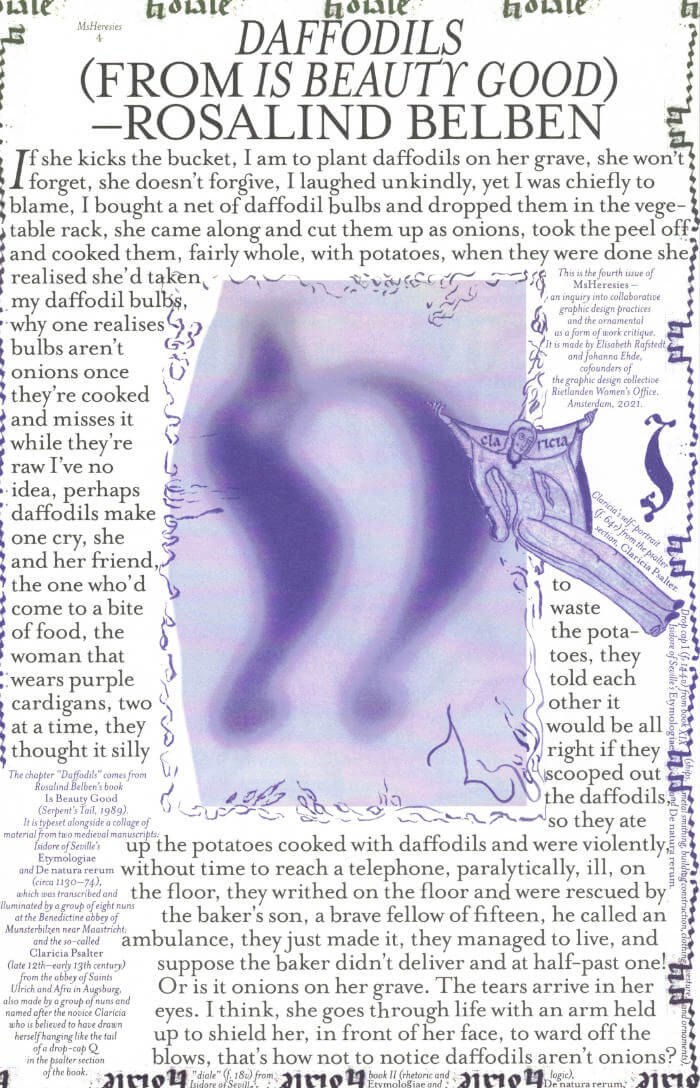
MsHeresies 4 — Daffodils
Elisabeth Rafstedt, Johanna Ehde
This fourth issue of MsHeresies republishes the chapter *Daffodils* — a warped monologue about a domestic poisoning — from Rosalind Belben’s book Is Beauty Good (1989).
It is typeset alongside a collage of material from two medieval manuscripts: Isidore of Seville’s Etymologiae and De natura rerum (circa 1130–74), which was illuminated and transcribed by a group of eight nuns at the Benedictine abbey of Munsterbilzen in Maastricht; and the so called Claricia Psalter (late 12th–early 13th century) from the abbey of saints Ulrich and Afra in Augsberg, also made by a group of nuns and named after the novice Claricia who is believed to have drawn herself hanging like the tail of a drop-cap Q in the psalter section of the book.
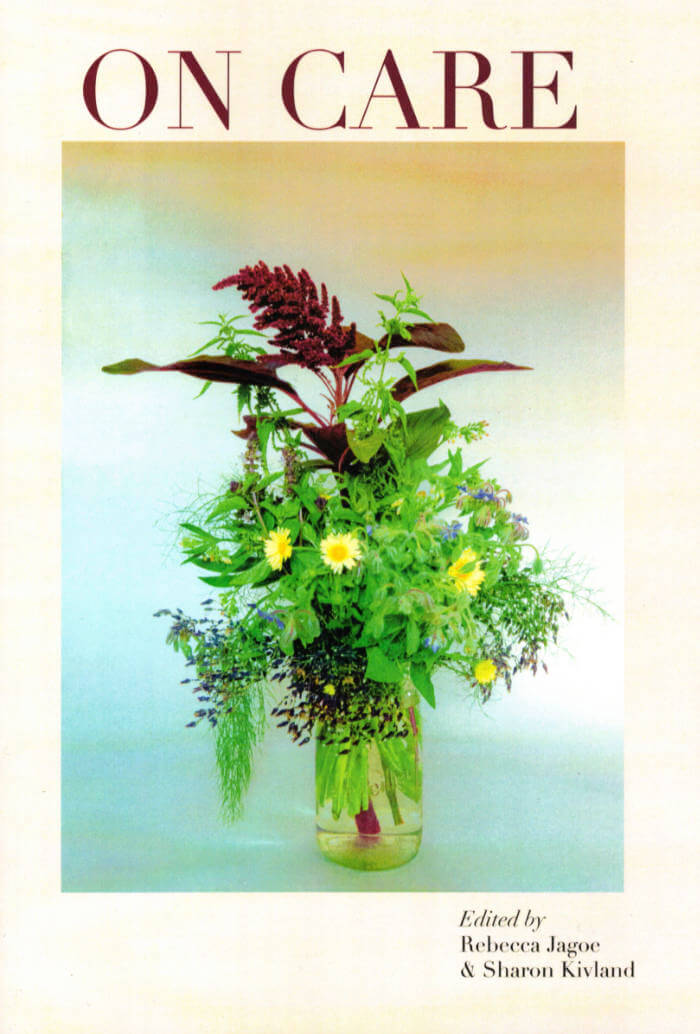
On Care
Care is a matter of responsibility for human and nonhuman allies, an ecological network. Care is an imperative, and acting with care approaches the world beyond selfhood. ON CARE, an aggregate of voices, discusses the politics of caring, support, and the role of welfare in an increasingly neoliberal society. It questions who is seen as worthy of care, whose narratives are given attention, and whose lives are overlooked in a complex web of assemblages: conceptions of medical authority, the co-option of self-care in political rhetoric, care as a commodity in the hospitality industry, intergenerational intimacy, sexecology; care as utopian and care as transactional. ON CARE maps a constellation of perspectives, as testaments, fictions, and essays, addressing the relation between good health, interdependence, and the ethics of (self)care.
Contributors: Tom Allen, Uma Breakdown, Alice Butler, Oisín Byrne, Julia Calver, Jamie Crewe, Juliette Desorgues, Rachel Genn, Laura Godfrey-Isaacs, Laura González, Holly Graham, Helen Hester, Justin Hogg, Juliet Jacques, Mati Jhurry & Rebecca Jagoe, Juliet Johnson, Sophie Jung, Daisy Lafarge, Elisabeth Lebovici, Rebecca Lennon, Rona Lorimer, Katharina Ludwig, Mira Mattar, Martina Mullaney, Cinzia Mutigli, Carolina Ongaro, Molly Palmer, Roy Claire Potter, Nat Raha, Helena Reckitt, Ruiz Stephinson, Erica Scourti, Victoria Sin, Himali Singh Soin & Tyler Rai, Miguel Soto Karlovic, Isabella Streffen, Jamie Sutcliffe, Maija Timonen, Lynn Turner, Rosa-Johan Uddoh, Daniella Valz Gen, Nina Wakeford, Alberta Whittle

Notes on Evil
An investigation into the current social architectures that determine the perception of the notion of "evil"... and the production of figures that embody it.
What is evil? How is it categorized, understood, and used as a tool? Surveying recent examples of "evil" which have taken hold in mass culture, Notes on Evil examines the mechanisms by which societies construct new enemies in a collective bid to rid themselves of their problems, usually culminating in largely superficial or aestheticized purges. Do societies necessarily need to create evil villains in order to function? And is the villain's role best understood as that of a court jester, who symbolically appears to mock the sovereign, while actually reinforcing their position of power?
Artist and writer Steven Warwick reflects on the overlapping social architectures which frame our current discourse on good and evil, ultimately charting a path beyond our present climate of reductivism, false binaries, and collective impasse.
Steven Warwick is a British artist, musician and writer residing in Berlin. His practice includes durational performance installations, plays and films using the construction of situations and language. He also makes music under his own name, and previously as Heatsick. His writing has appeared in Texte zur Kunst, Frieze, Urbanomic, Artforum, Spike and Electronic Beats and has co-authored a book released on Primary Information.

Faux Pas: Selected Writings and Drawings (2nd edition)
This new edition of Faux Pas, the acclaimed collection of writings by Amy Sillman, comes as an expanded edition, with the addition of new essays, including recent texts on Paul Cézanne, Carolee Schneemann, Elizabeth Murray and Louise Fishman. The previously unpublished text from a lecture on drawing complements Sillman's views on color and shape. New drawings from 2020-22 include a selection of works on paper that were part of the artist's installation at the 59th International Venice Biennale, The Milk of Dreams, in 2022.
Since the 1970s, Sillman, a beloved and key figure of the New York art scene, has developed a singular body of work that includes large-scale gestural paintings blending abstraction with representation, as well as zines and iPad animations.
Over the past decade, Sillman has also produced stimulating essays on the practice of art or the work of other artists: for example, reevaluating the work of the abstract expressionists with a queer eye; elaborating on the role of awkwardness and the body in the artistic process; and discussing in depth the role and meanings of color and shape. Featuring a foreword by Lynne Tillman, Faux Pas gathers a significant selection of Sillman's essays, reviews and lectures, accompanied by drawings, most of them made specially for the book.
Faux Pas aims at revealing the coherence and originality of Sillman's reflection, as she addresses the possibilities of art today, favoring excess over good taste, wrestling over dandyism, forms over symbols, with as much critical sense as humor.
Based in New York City, Amy Sillman (born 1955) is an artist whose work consistently combines the visceral with the intellectual. She began to study painting in the 1970s at the School of Visual Arts and she received her MFA from Bard College in 1995. Her work has been exhibited internationally, including at the Whitney Biennial in 2014 and the Venice Biennale in 2022; her writing has appeared in Bookforum and Artforum, among other publications. She is currently represented by Gladstone Gallery, New York.

Abolish the Family: A Manifesto for Care and Liberation
What would it be like to imagine a communism not just of wealth but also of care, love and belonging? Where the full range of human needs are met without depending on the fragile bubble of the nuclear family? That institution we are all supposed to believe will be there for us—even though so many books and films detail all the ways in which it fails. This is the difficult yet important terrain where Sophie Lewis ventures. Abolish the Family is a short, sharp shock to our assumptions about the good life and how to achieve it.
Sophie Lewis is a freelance writer living in Philadelphia, teaching courses for the Brooklyn Institute for Social Research. Her first book was Full Surrogacy Now: Feminism Against Family, and her essays have appeared in the New York Times, Harper's, Boston Review, n+1, the London Review of Books and Salvage. Sophie studied English, Politics, Environment and Geography at Oxford, the New School, and Manchester University, and is now an unpaid visiting scholar at the Feminist, Queer and Transgender Studies Center at the University of Pennsylvania.

In Pursuit of Revolutionary Love: Precarity, Power, Communities
Violence is arrayed against us because we’re Black, or female, or queer, or undocumented. There is no rescue team coming for us. With that knowledge, we need a different operational base to recreate the world. It is not going to be a celebrity savior. Never was, never will be. If you’re in a religious tradition that is millennia-old, consider how the last savior went out. It was always going to be bloody. It was always going to be traumatic. But there’s a beauty to facing the reality of our lives. Not our lives as they’re broken apart, written about, and then sold back to us in academic or celebrity discourse. But our lives as we understand them. The most important thing is showing up. Showing up and learning how to live by and with others, learning how to reinvent ourselves in this increasing wasteland. That’s the good life.
Foreword by Da’Shaun L. Harrison.
Afterword by Mumia Abu-Jamal.
"Joy James’s Revolutionary Love is umph-degree love; or love beyond measure. It is anything love. It is love without reckoning. It is love that dares all things, beyond which others may find the spirit-force to survive; to live to fight another day. Such love is also fighting itself, for the sake of ensuring that others may live." — Mumia Abu-Jamal
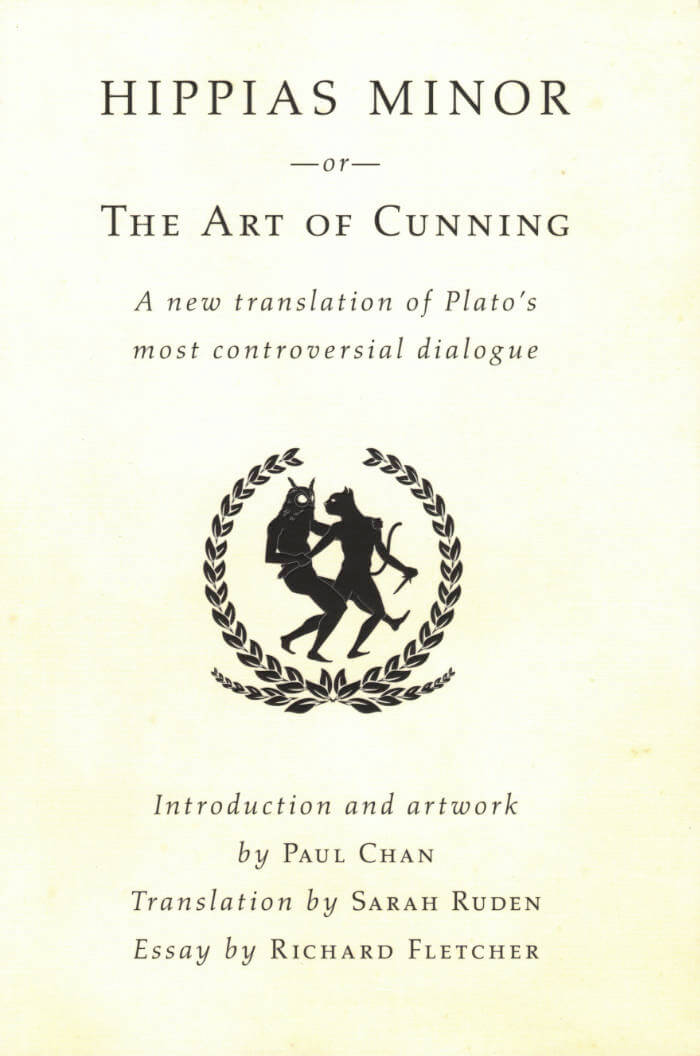
Hippias Minor or the Art of Cunning: A New Translation of Plato's Most Controversial Dialogue
One of Plato's most controversial dialogues, Hippias Minor details Socrates' claims that there is no difference between a person who tells the truth and one who lies, and that the good man is the one who willingly makes mistakes and does wrong. But what if Socrates wasn't merely championing the act of lying—as the dialogue has been traditionally interpreted—but, rather, advocating the power of the creative act?
In this new translation by Sarah Ruden, Hippias Minor is rendered anew as a provocative dialogue about how art is a form of wrongdoing. The accompanying introduction by artist Paul Chan and essay by classicist Richard Fletcher argue that an understanding of the dialogue makes life more ethical by paradoxically teaching one to be more cunning.

Pleasure Activism: The Politics of Feeling Good
How do we make social justice the most pleasurable human experience? How can we awaken within ourselves desires that make it impossible to settle for anything less than a fulfilling life? Author and editor adrienne maree brown finds the answer in something she calls "pleasure activism," a politics of healing and happiness that explodes the dour myth that changing the world is just another form of work. Drawing on the black feminist tradition, she challenges us to rethink the ground rules of activism. Her mindset-altering essays are interwoven with conversations and insights from other feminist thinkers, including Audre Lorde, Joan Morgan, Cara Page, Sonya Renee Taylor, and Alexis Pauline Gumbs. Together they cover a wide array of subjects—from sex work to climate change, from race and gender to sex and drugs—building new narratives about how politics can feel good and how what feels good always has a complex politics of its own.
Building on the success of her popular Emergent Strategy, brown launches a new series of the same name with this volume, bringing readers books that explore experimental, expansive, and innovative ways to meet the challenges that face our world today. Books that find the opportunity in every crisis!
adrienne maree brown, author of Emergent Strategy and co-editor of Octavia's Brood, is a social justice facilitator focused on black liberation, a doula/healer, and a pleasure activist. She lives in Detroit.
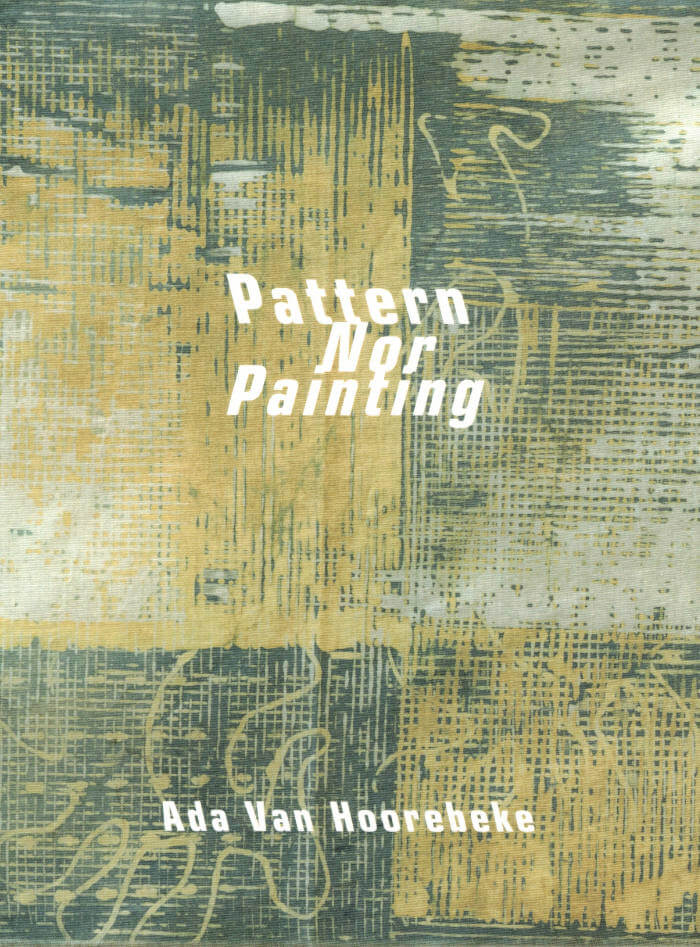
Pattern Nor Painting
The motifs produced during time-intensive dyeing processes – which uses indigo, urine, and extracts of natural waste materials – are neither conventional fabric nor lace patterns, and they have only a distant relationship to batik painting. Yet, they are simulations and portraits of both.
Pattern Nor Painting starts in a batik Workshop in Bantul, Indonesia where an artist reconnects with her blank canvas and the batik techniques she learned from an artist in Serekunda, the Gambia many years ago. As documented in this publication Van Hoorebeke’s installations and performances deftly combine unique textiles and ceramics with production-chain goods, ranging from car parts to strawberry jam. Engaging with ages-old traditions of batik production for present-day communities and settings, her work embodies ancient craft, story-telling, time, female thinking, and above all, a connection to the natural world.

The Artist Job Description, for the Employment of the Artist, as an Artist, Inside the Art Institution
“The artist’s experience of being inside art institutions, starting from the effort made to be accepted in order to develop one’s art practice, then the experience of going through them, and while in them, the many ways of having to learn how to be inside. This will in several ways inform the development of an artist’s practice, for the good or for the bad. Making this publication has been an attempt at recognizing and dealing with, rather than avoiding, the tensions that exist in the relationship between artists and art institutions at a time when most art institutions themselves are under the pressure of austerity-politics.”
The Artist Job Description, for the Employment of the Artist, as an Artist, Inside the Art Institutionconstitutes the result of Vijai Maia Patchineelam’s PhD research in the arts at the Royal Academy of Fine Arts Antwerp, University of Antwerp and a.pass, advance performance and scenography studies, Brussels.
Authors for the research seminar ‘Descriptions Change, The Artist Job Description: ADRIJANA GVOZDENOVIĆ, EVI OLDE RIKKERT, FELIX RAPP, JOEP VOSSEBELD, JULIA DAHEE HONG AND PIA LOUWERENS
Copy-editor for ‘The Artist Job Description, For the Employment of the Artist, as an Artist, Inside the Art Institution’: HEMANT SAREEN
Co-Editor for thickets: FABIEN SILVESTRE SUZOR
Proof-reader: SARAH PREDDY
Graphic design: NINA BAČUN AND ROBERTA BRATOVIĆ (OAZA, ZAGREB)
Printer: SVEUČILIŠNA TISKARA, ZAGREB
Edition: 400

Taming a Wild Tongue
Laura Cemin, Bianca Hisse and 1 more
Referring to Gloria Anzaldúa's notion of 'wild tongue' (Borderlands/ La Frontera, 1987), the publication departs from the questions: How to tame a wild tongue? How to carry language? The verbs 'taming' and 'carrying' imply certain dynamics of permission and restriction of movement, and suggest the entanglement between language and the body. The project delves into the notion of 'tonuge' as an archive: the 'tongue' as a muscle shaped by the physical practice of moving/ talking, having memory; the 'tongue' as a 'cultured' part of the body. It addresses accent as part of our linguistic identity, but also something that defines access or restriction. (From Monika Charkowska's preface to the publication)
Artists: Bianca Hisse, Laura Cemin
Curated by: Monika Charkowska
Texts by: Monika Charkowska, Claire Goodall, Kübra Gümüsay, Bianca Hisse, Laura Cemin
Edited by: Monika Charkowska
Translations: Epp Aareleid (ENG to EST), Ksenia Krimer (ENG to RUS), Keiu Krikmann (ENG to EST), Anita Kodanik (ENG to RUS)
English Proof-Reading: Epp Aareleid
Graphic Design: Kersti Heile
Edition of 200.
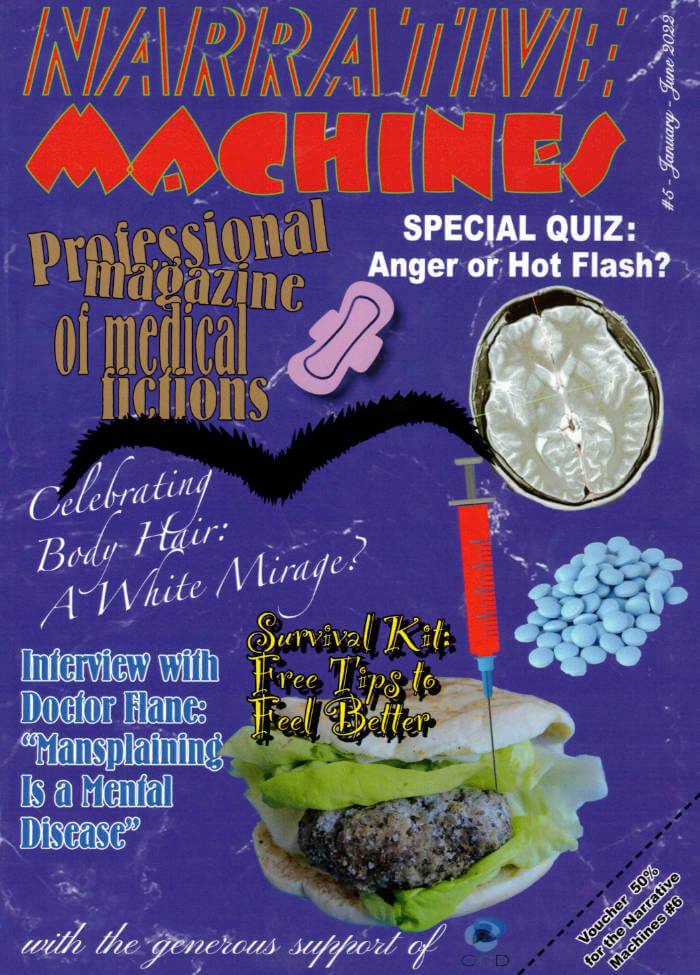
Narrative Machines – Professional magazine of medical fictions
An artist's book disguised as a medical publication written by six fictional women characters from Morocco in free wheeling, Narrative Machines clothes truth with falsehood. With wry irony and Google English it comments on paranoia, fake news, patriarchy, power and media ganging together in the Maghreb (and everywhere else). But it also shows a chosen community of women who confide, support each other and laugh a good load.
Are there weird questions that have been haunting you all your life? Do you wonder why you pass out each mother in law comes to your place? Do you smell fish when you cook meat? Do you know of miraculous medical machines that have been forgotten by official history? What's your take on alternative medicine? Have you ever heard about the Markar, the cardiological device invented by King Hassan II of Morocco? Do you love watching Noujoum Al 3ouloum (Stars of Sciences)? Is your herbalist your best friend? Do you ever wonder if you should wax your arms? In your daily life, do you struggle sometimes with your feminist ethic? Do you put snail cream on your face? Write to us! Join our community! Be part of the Narrative Machines family!
Ghita Skali (born 1992 in Casablanca) is an artist based in Amsterdam. She studied in France, first at Villa Arson, Nice then at the post-graduate program of the Fine Arts School in Lyon. She was a De Ateliers (Amsterdam) resident between 2018 and 2020. She notably exhibited recently at Kunsthal extra City (Antwerp), Palais de Tokyo (Paris) and at the Stedelijk Museum (Amsterdam).
Texts by Kaoutar Chaqchaq, Ayla Mrabet, Ghita Skali
Graphic design: Roxane Maillet
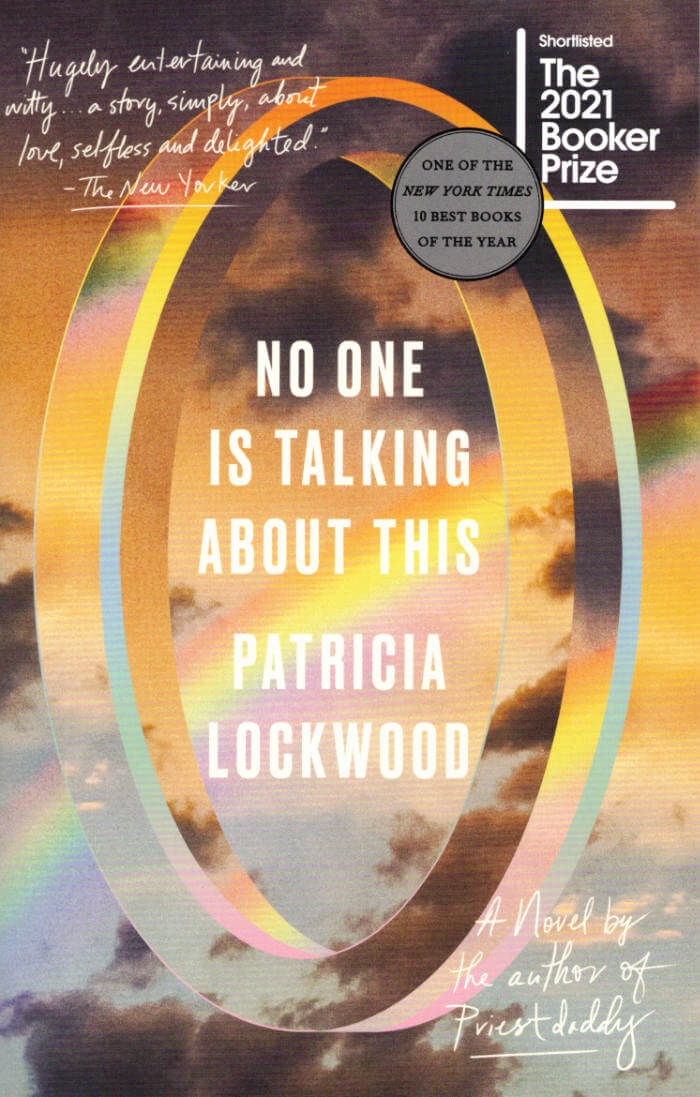
No One Is Talking about This
As this urgent, genre-defying book opens, a woman who has recently been elevated to prominence for her social media posts travels around the world to meet her adoring fans. She is overwhelmed by navigating the new language and etiquette of what she terms the portal, where she grapples with an unshakable conviction that a vast chorus of voices is now dictating her thoughts.
When existential threats—from climate change and economic precariousness to the rise of an unnamed dictator and an epidemic of loneliness—begin to loom, she posts her way deeper into the portal's void. An avalanche of images, details, and references accumulate to form a landscape that is post-sense, post-irony, post-everything. Are we in hell? the people of the portal ask themselves. Are we all just going to keep doing this until we die? Suddenly, two texts from her mother pierce the fray: Something has gone wrong, and How soon can you get here? As real life and its stakes collide with the increasingly absurd antics of the portal, the woman confronts a world that seems to contain both an abundance of proof that there is goodness, empathy, and justice in the universe, and a deluge of evidence to the contrary.
Fragmentary and omniscient, incisive and sincere, No One Is Talking About This is at once a love letter to the endless scroll and a profound, modern meditation on love, language, and human connection from a singular voice in American literature.

Entertaining Ideas (The Long View)
Imagine that we too (imagine that I too), wanted to welcome ideas, to attend to them, to take care of them, to make sure they have a good time. Imagine that I too wanted to be a good hostess to writing ideas. How to be open to them, how to be alert to them—so that I know how and when to let them in?
ENTERTAINING IDEAS began as a reading exercise: an effort to perform a ‘good reading’ of Elizabeth Jane Howard’s The Long View(1956), and to think about what a ‘good’ short reading of a long novel might mean, what it might look like or read like. As a translator, Kate Briggs accepts that writing out a reading involves change, tampering with what seems perfect, and doing so from necessity, as a way of learning how exactly it works. She has changed Howard’s book. Her exercise changed too, expanding unexpectedly into a set of reflections on writing backwards, living forwards, and entertaining ideas.
‘Kate Briggs generously shares with us her unique and delicately revolutionary way of reading; the moment where writing becomes the only way to grasp our slippery thoughts and desires. This book is pure joy.’
– >Alejandro Zambra
Kate Briggs is a writer and translator based in Rotterdam, NL. She is the translator of two volumes of lecture and seminar notes by Roland Barthes (Columbia University Press, 2011 and 2013). Other publications include:Exercise in Pathetic Criticism (Information as Material, 2011), On Reading as an Alternation of Flights and Perchings (NO Press, 2013), and The Nabokov Paper (Information as Material, 2013). This Little Art, a long essay on the practice of translation, was published by Fitzcarraldo Editions in 2017.
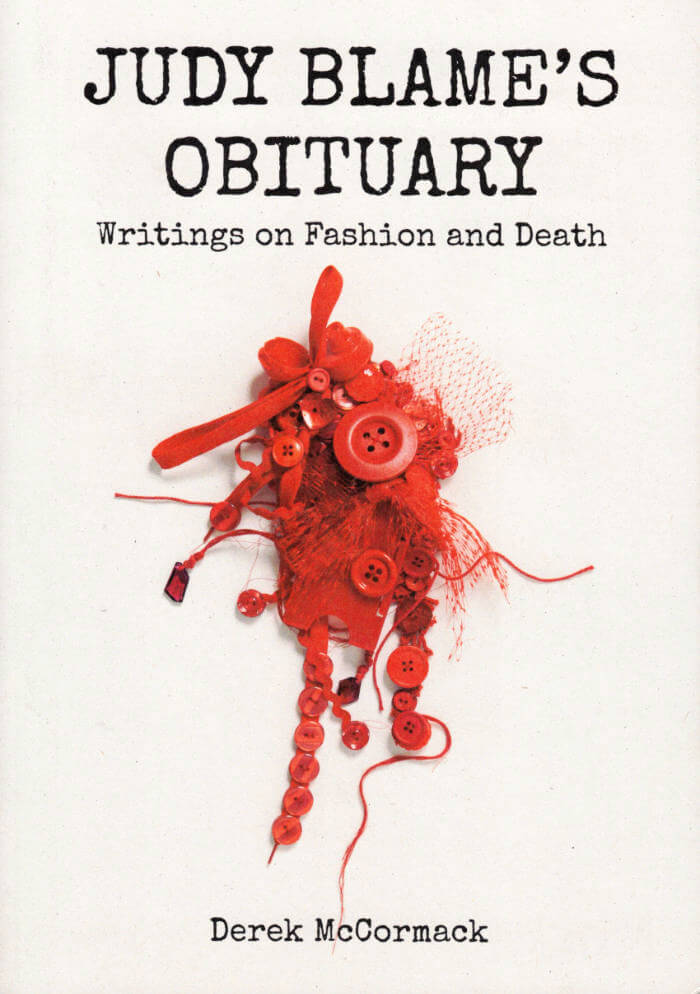
Judy Blame’s Obituary: Writings on Fashion and Death
Derek McCormack is the author of fashion-inflected novels that cast luminaries such as Elsa Schiaparelli and Balenciaga as characters. This collection brings together for the first time McCormack's fashion journalism. He writes about and interviews fashion figures that fascinate him, tracing the ways they inspire and inhabit his novels. The result is a sort of memoir in essays: as he writes, "My tribute to [Judy] Blame is about him and about me—there are lots of my own tales woven in with the topics I touch on. The writing here is a sort of autobiography, a life seen through a scrim, or a life as a scrim—my moire mémoire."
Judy Blame's Obituary contains twenty years' worth of reminiscences, reviews of fashion shows and books, interviews with writers about fashion, and interviews with fashion designers about writing. He talks to Nicolas Ghesquière about perfume, and to Edmund White about which perfume he wore as a young fag in New York City. He inspects the clothes that Kathy Acker left behind when she died, and he summons the spirit of Margiela in a literary seance. He traces the history of sequins, then recounts the cursed story of Vera West, the costume designer who dressed the Bride of Frankenstein. These pieces were all previously published, some in Artforum, some in The Believer, and some in underground publications like Werewolf Express—what binds them together is a sense that though fashion victimizes us, this victimization is sometimes a sort of salvation.
Derek McCormack is a Canadian writer. His most recent novels are The Well-Dressed Wound and Castle Faggot, both published by Semiotext(e). Of Castle Faggot, Dennis Cooper said: "It is really just one of the best books ever, and maybe the greatest novel ever written.
Praise for Judy Blame's Obituary:
'Derek McCormack, Canada's most famous author as yet unsullied by Nobel Prize or television adaptation, hides in plain sight as a fashion journalist. Parallel to his writing incantatory, scatalogical fiction, he has reviewed collections and interviewed the great and good of la mode. His divagations are often darkly hilarious and always exquisitely tailored. The sublime and the ridiculous coexist in his prose, as they do in life. Fashion victims, ignore his insights at your peril.' — William E. Jones
Published by Pilot Press, 20 × 15 cm, Softcover, 2021

Time Is A Mother
How else do we return to ourselves but to fold
The page so it points to the good part
In this deeply intimate second poetry collection, Ocean Vuong searches for life among the aftershocks of his mother's death, embodying the paradox of sitting within grief while being determined to survive beyond it. Shifting through memory, and in concert with the themes of his novel On Earth We're Briefly Gorgeous, Vuong contends with personal loss, the meaning of family, and the cost of being the product of an American war in America. At once vivid, brave, and propulsive, Vuong's poems circle fragmented lives to find both restoration as well as the epicenter of the break.
The author of the critically acclaimed poetry collection Night Sky With Exit Wounds, winner of the 2016 Whiting Award, the 2017 T. S. Eliot Prize, and a 2019 MacArthur fellow, Vuong writes directly to our humanity without losing sight of the current moment. These poems represent a more innovative and daring experimentation with language and form, illuminating how the themes we perennially live in and question are truly inexhaustible. Bold and prescient, and a testament to tenderness in the face of violence, Time Is a Mother is a return and a forging forth all at once.

OEI #82-83 Art in the Age of Kleptomania
Jonas J. Magnusson, Cecilia Grönberg and 1 more
Aeron Bergman and Alejandra Salinas, co-editors at INCA Press (along with Irena Borić), are the guest-editors of this issue of OEI: it contains essays, artworks, and archival materials by 21 artists, theorists, writers, and artist-run spaces (mostly from the Americas).
The subject of the issue is art and neoliberalism, and it encompasses essays, images and other works by Dorothée Dupuis, Max Jorge Hindered Cruz, Luciano Concheiro, Yvonne Osei, Diego Bruno, John Riepenhoff, Suhail Malik, Good Weather, The Luminary, Bikini Wax, Beta-Local and more.
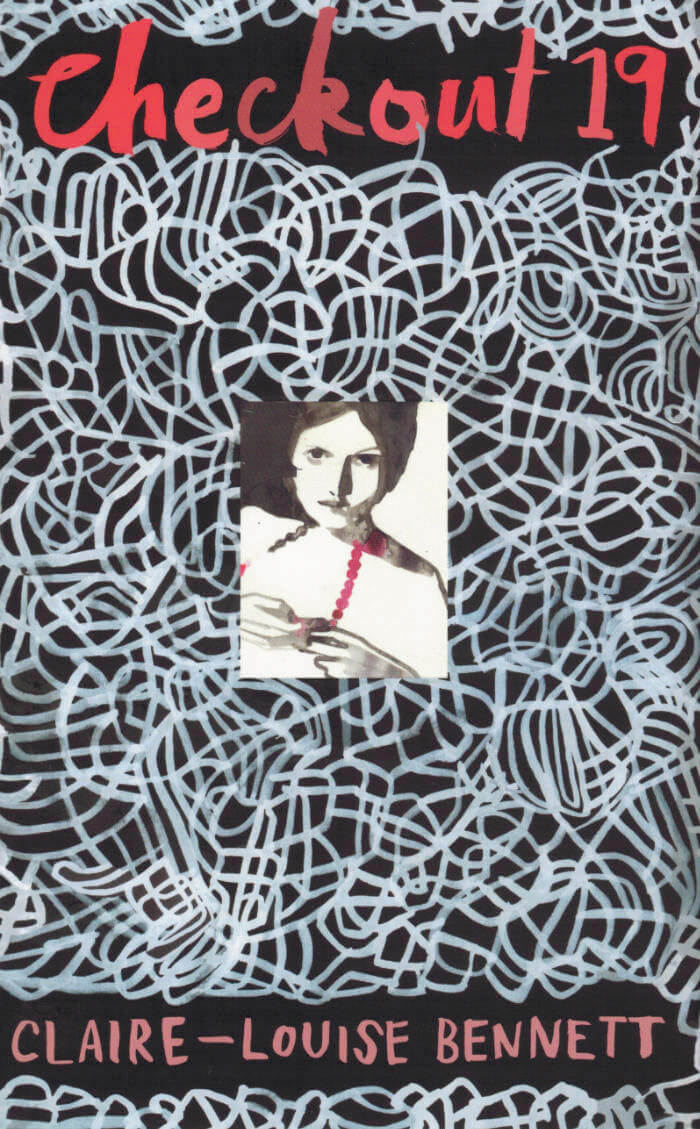
Checkout-19
In a working-class town in a county west of London, a schoolgirl scribbles stories in the back pages of her exercise book, intoxicated by the first sparks of her imagination. As she grows, everything and everyone she encounters become fuel for a burning talent. The large Russian man in the ancient maroon car who careens around the grocery store where she works as a checkout clerk, and slips her a copy of Beyond Good and Evil. The growing heaps of other books in which she loses-and finds-herself. Even the derailing of a friendship, in a devastating violation. The thrill of learning to conjure characters and scenarios in her head is matched by the exhilaration of forging her own way in the world, the two kinds of ingenuity kindling to a brilliant conflagration.

Be Good, If You Can't Be Good, Be Good at It Boom Boom Boom Boom
Rebecca Jane Arthur, Eva Giolo
BE GOOD, IF YOU CAN’T BE GOOD, BE GOOD AT IT Boom Boom Boom Boom is a publication composed of letters, notes, anecdotes,translations, stills and images: all traces of the creative process. The artists Rebecca Jane Arthur and Eva Giolo bring together their correspondence on the act of writing and of filmmaking, in all its complexity, struggles and playfulness.
The letters unpack themes such as the challenge of making personal work and the strength found in sharing vulnerability; the act of writing itself, language and translation; writing on moving images, on their practices and that of others; and the notion of a place as a container of memories, of interiority and the confrontation with home. The publication uses words and texts as images, and all images of persons or things are hidden. The publication acts as a negative to the films that we create, revealing that which cannot be.
Publisher: Les éditions du CVB
Publication Date: March 2021
Language : English & French
ISBN: 978-2-9601799-7-2
Softback, 311 pages, fully illustrated